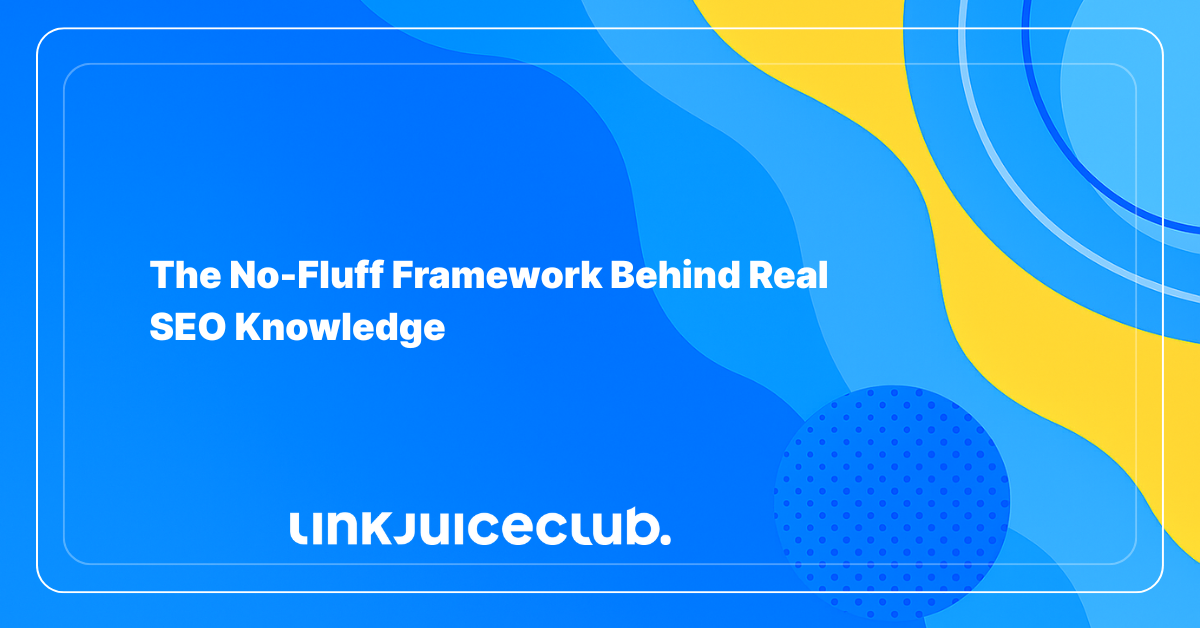
The No-Fluff Framework Behind Real SEO Knowledge
Forget what you think you know about SEO cheat sheets. This isn’t some dusty blueprint pulled from a marketer’s sock drawer. What we’re talking about here is a widely respected, battle-tested framework built to sharpen your SEO knowledge (and give structure to what can often feel like a chaotic, ever-shifting digital landscape).
And while some features may punch harder in specific niches or industries, the truth is, nobody – not even the most caffeinated Googler – knows exactly how the algorithm weights it all.
So, let’s build your SEO knowledge, understand the full picture, and execute across the board like a pro!

1. Content that Actually Deserves to Rank (Not Just Show Up)
Here’s the thing: without content, your site is basically a digital ghost town.
But hold up – content for the sake of content? That’s like yelling into the void and hoping Google says: Hey, nice noise! It doesn’t work like that. What you publish needs purpose, punch, and polish. That’s where real SEO knowledge kicks in.
Content that ranks is content that earns it. We’re talking helpful, high-quality stuff your audience actually wants to read.
Speaking of keywords, they still matter, but no stuffing, no spamming, no awkward sentences that sound like an AI trying to flirt. Just use them naturally, the way humans speak (because we’re writing for humans, not algorithm-bots).
Freshness counts too. If your blog still brags about the 2017 mobile trend that’s changing everything, you’re not just behind – you’re fossilized. Keep things updated and give your best-performing content a makeover every now and then. Google loves a glow-up!
And while you’re at it, make sure your content is actually relevant and accurate. No one likes clickbait. If your title promises a deep dive into beginner-friendly SEO tips, don’t serve up a vague listicle and call it a day. Deliver substance. Go deep. Answer questions fully. Add media that enhances the message (visuals, videos, even a podcast snippet if it helps your point land harder).
Oh, and please, speak your audience’s language. If you’re targeting English-speaking Canadians, don’t toss in random French idioms unless there’s a good reason (or punchline).
2. Building Sites That Don’t Confuse Crawlers or Humans
Even the most amazing content in the world won’t rank if your site’s structure is a hot mess. Your internal architecture is the unsung hero of SEO, and if your site’s harder to navigate than a hedge maze with no exit, you’re leaving both users and Google bots banging their heads against the wall.
Here’s how smart SEO knowledge comes into play. First up, crawling: your site has to be accessible. If search engines can’t reach or render your pages properly, your rankings are toast before they ever had a chance. Make things crawlable!
Next, we’ve got taxonomy (and no, that’s not a biology term here). We’re talking about organizing your site with clear categories, topic clusters, and internal links that help search engines understand how your content fits together.
Page structure matters too. Don’t overload a page with clutter or distractions. Keep your main content front and center, and separate it from ads or sidebars so both users and crawlers can focus on what actually matters
While we’re at it, don’t overthink URLs. Keep them short, descriptive, and readable. No random strings of numbers or incoherent jargon.
Finally, lock it all down with HTTPS. It’s not just a trust signal anymore, it’s a must. If you want users to stick around (and not bounce off your site faster than a ping pong ball), secure their connection. Google’s watching!
3. Code Is Dominating Search, Too
Most people don’t peek under the hood of a website. But search engines do. And what they find in your site’s code can make or break your SEO performance.
No, you don’t need to moonlight as a developer or become a JavaScript ninja, but understanding how clean, efficient code works? That’s SEO knowledge 101.
The real magic starts with your HTML. Those title tags? They’re your billboard in search results, short, snappy, and click-worthy. Meta descriptions? Think of them as your elevator pitch. Headers should organize your content with natural keyword placement that doesn’t scream keyword stuffing from 2012.
Oh, and images? Don’t leave them naked, wrap them up in alt text that’s both descriptive and accessible. It’s good for SEO, and good for humans.
So even if you’re not writing it yourself, your site’s code deserves attention. Because behind every high-ranking site is a foundation of solid markup doing the heavy lifting.
4. Trust Is the New Currency, and Credibility Is Your Wallet
Welcome to the part of SEO that’s less about keywords and more about character. You can have the flashiest site, the smartest code, and the slickest content, but if people (and search engines) don’t trust you? Good luck climbing the rankings.
Google’s looking for signals of E-E-A-T: Experience, Expertise, Authoritativeness, and Trustworthiness. If that sounds like your website needs to pass a background check, well… yeah, it kind of does. Your content should radiate confidence, not confusion. It should feel like it’s written by someone who’s been there, done that, not someone who googled the topic five minutes before writing.
So, what makes people trust your site? For starters, honesty. Be accurate, be transparent, and don’t try to game the system. If your content is based on real experience, highlight that. If your writers are pros in their field, let their expertise shine through. Authority isn’t self-declared, it’s earned through consistent quality, citations from other respected sources, and a trail of positive mentions across the web.
5. Link Building: Still the Cool Kid on the SEO Block
Links, the OG flex of the SEO world. Ever since Google’s PageRank shook the internet in the late ’90s, links have carried serious weight. But today? It’s about quality, context, and how you play the game.
Let’s break it down. Inbound links (a.k.a. backlinks) are still golden. The good ones come from credible, niche-relevant websites that would make you proud even if search engines didn’t exist. These links are votes of confidence.
And then we’ve got anchors. These clickable words in a link should be short, sweet, and make sense in context. No shady keyword stuffing here. Finally, external links, those links you give to others, matter more than people think. When you link out to trusted sources, it boosts your content’s value and shows you’re not afraid to share the spotlight.
6. User Experience Is the Whole Game
Google’s not messing around when it says: Focus on the user and all else will follow. That’s the heart of everything you should be doing. If your content doesn’t serve your audience, your rankings are toast. Harsh, but true.
So, let’s talk about what the users actually want. First, they want to access your content, literally. That means your site needs to be friendly to all users, regardless of device or ability.
Second, you’ve got to nail intent. Behind every keyword is a real human with real goals, fears, questions, problems. Understand those, and you’re not just doing SEO; you’re solving problems.
Then comes interaction. Google’s watching how users engage and uses that data to decide if your content is doing its job. And if you’re targeting a local audience, you better be dialed into your neighborhood vibe.
Most importantly, your content has to satisfy. If someone lands on your page and bounces out to a competitor for answers, that’s a fail. The ultimate win? Helping your visitors accomplish something!
7. Performance: Because No One Waits for a Slow Site
If your site loads like it’s on dial-up, users (and Google) will leave you in the dust.
Your pages should load fast, everywhere, every time. No bloated scripts, no oversized images, no excuses. If it takes longer than a couple seconds, you’re already losing visitors.
Responsiveness is next, and we’re not just talking about mobile-friendliness. We’re talking about how quickly your site reacts when someone clicks, taps, or swipes. The smoother, the better.
And don’t forget visual stability. You know that annoying jump when a button or image moves mid-load and you accidentally click something you didn’t want to? So, clean, stable layouts keep users happy and focused.
Where Solid SEO Knowledge Meets Serious Results
As you could see, mastering SEO isn’t about chasing the latest tricks. Instead of that, it’s about building a deep foundation of SEO knowledge that evolves with the game. From content creation and site architecture to user experience and link strategy, every element plays a role in how well you rank, how much traffic you attract, and how long users stick around.
But here’s the thing: knowing what to do is just the start; doing it right is where the magic happens. That’s where Link Juice Club comes in. Whether you’re hunting for high-authority backlinks that actually move the needle, or craving content that doesn’t just fill space but converts, our crew has you covered.
So if you’re ready to supercharge your rankings, sharpen your strategy, and finally work with a team that gets it (and gets results), you know where to find us!





